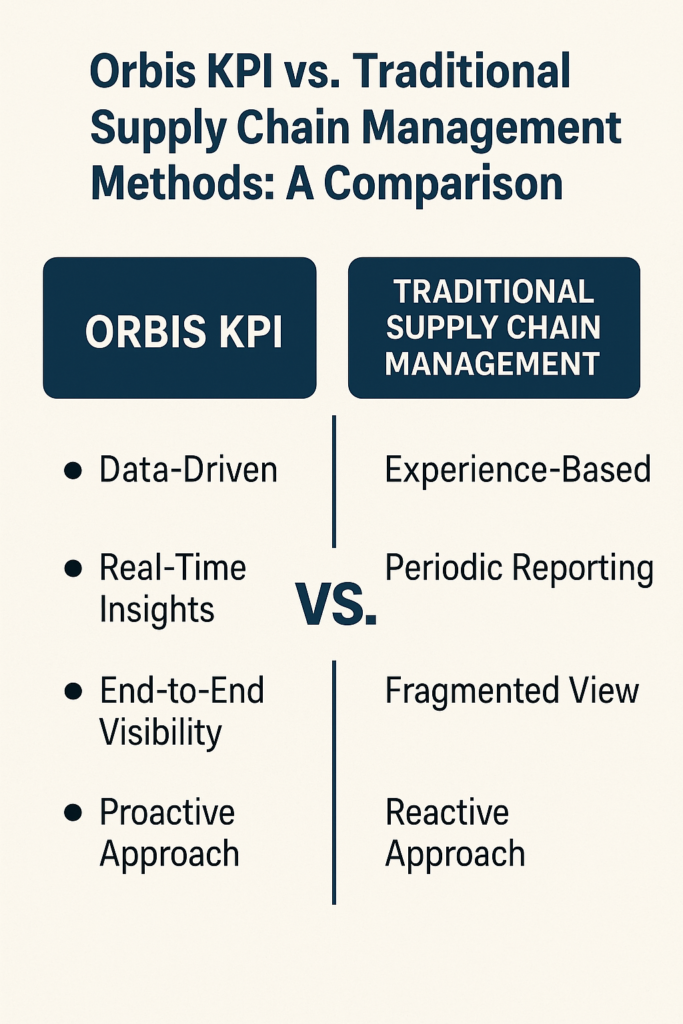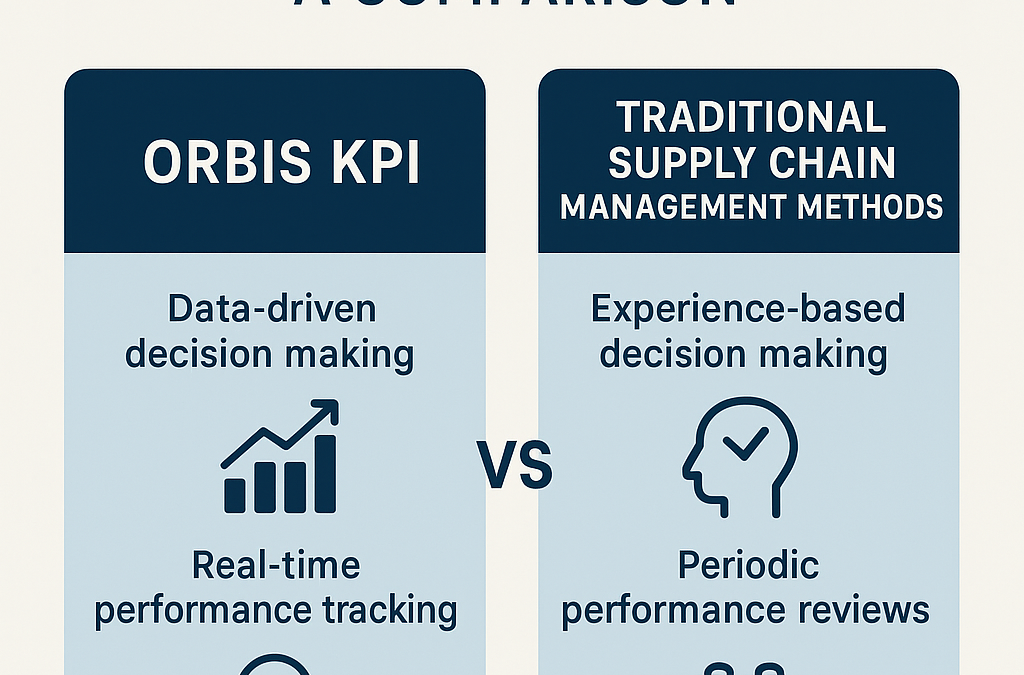Have you ever felt like managing your supply chain is like steering a massive ship through fog without a compass? If you’re nodding yes, you’re not alone. Operations managers everywhere face the daunting task of keeping logistics flowing smoothly, costs in check, and customers satisfied.
But what if there was a better way to navigate the complexity? That’s where Orbis KPI enters the scene—a modern, data-driven alternative to traditional supply chain management methods. In this article, we’ll explore how Orbis KPI stacks up against the old ways and what it means for your operations.

1. Understanding Traditional Supply Chain Management Methods
Traditional supply chain management (SCM) relies heavily on manual processes, legacy systems, spreadsheets, and reactive planning. It’s like driving a car using only the rearview mirror—you’re always responding to what’s already happened.
Key characteristics:
- Fragmented data sources
- Siloed departments
- Delayed decision-making
- Static forecasting
This method can work, but it struggles under the pressures of today’s fast-moving global markets.
2. Challenges in the Traditional Approach
Why does the old way fall short? Here are some of the most common issues:
- Slow data flow: Information often travels through multiple layers, creating delays.
- Lack of visibility: Real-time tracking is rare, making it hard to act quickly.
- Limited scalability: As businesses grow, outdated systems can’t keep up.
- Manual errors: Spreadsheets and email chains are prone to human mistakes.
Imagine trying to play chess blindfolded. That’s how managing a modern supply chain feels without smart tools.
3. What is Orbis KPI?
Orbis KPI is a performance management platform specifically designed for supply chains. It’s a tool that monitors, measures, and reports key performance indicators (KPIs) in real time—think of it as your mission control dashboard for logistics.
Highlights:
- Intuitive interface
- Cloud-based accessibility
- AI-powered analytics
- Real-time data sync
It’s not just software—it’s a smarter way to manage everything from procurement to last-mile delivery.
4. How Orbis KPI Works
At its core, Orbis KPI connects with your existing systems—like ERPs, CRMs, and warehouse software—and gathers data from each. It then analyzes and visualizes that data in ways that help you make better decisions, faster.
The Process:
- Data Collection from multiple sources
- KPI Definition tailored to your business goals
- Real-Time Monitoring with alerts and dashboards
- Actionable Insights using machine learning
5. The Role of Supply Chain KPI in Decision Making
Supply chain KPI metrics are like a car’s dashboard—they show how fast you’re going, how much fuel you have, and when there’s a problem. Orbis KPI tracks metrics such as:
- Order accuracy
- Lead times
- Inventory turnover
- Supplier performance
- On-time delivery rates
With these insights at your fingertips, you’re not guessing—you’re steering.
6. Comparing Key Metrics: Orbis KPI vs. Traditional SCM
Let’s look at how performance indicators stack up:
| KPI | Traditional SCM | Orbis KPI |
|---|---|---|
| Order Accuracy | Manually tracked | Real-time alerts |
| Inventory Turnover | Monthly reports | Daily insights |
| Lead Time | Estimated | Calculated by real-time data |
| Supplier Scorecards | Annually updated | Continuously updated |
| Delivery Rates | Reactive adjustments | Predictive analytics |
Winner? Clearly, Orbis KPI is the more proactive and data-driven option.
7. Real-Time Visibility and Tracking
Imagine having a live GPS for every product in your pipeline. Orbis KPI delivers just that. You’ll know:
- Where items are
- When they’re delayed
- Who’s accountable
This level of clarity is almost impossible with traditional methods.
8. Agility and Responsiveness
What happens when there’s a disruption—like a late shipment or supplier issue?
In traditional systems, you might find out days later. With Orbis KPI, alerts are instant, allowing you to pivot quickly, reassign resources, or notify customers in real time.
9. Data Accuracy and Forecasting
In SCM, bad data = bad decisions. Orbis KPI cleans and verifies data constantly, helping you:
- Forecast demand
- Prevent stockouts
- Avoid overstocking
Forecasting with traditional methods is like predicting the weather with a flip phone—possible, but not precise.
10. Integration and Scalability
Orbis KPI is built to grow with you. It integrates with most modern platforms:
- SAP
- Oracle
- Salesforce
- Microsoft Dynamics
Unlike rigid legacy systems, Orbis adapts to your business model and scales across geographies.
11. Cost Efficiency and ROI
While Orbis KPI requires an upfront investment, it often pays for itself by:
- Reducing waste
- Preventing delays
- Improving vendor performance
- Lowering inventory carrying costs
Traditional methods, in contrast, often incur hidden costs through inefficiencies.
12. User Experience and Learning Curve
Orbis KPI is built for ease. Dashboards are intuitive, drag-and-drop features simplify reporting, and training is minimal.
Traditional systems? Think thick manuals, IT requests, and endless Excel sheets.
13. Case Study: Orbis KPI in Action
Company X, a mid-sized electronics distributor, shifted from spreadsheets to Orbis KPI.
Results:
- 28% faster order processing
- 15% drop in inventory costs
- 40% improvement in on-time deliveries
- Happier customers and fewer complaints
The transformation wasn’t just operational—it was cultural.
14. Which Is Right for You?
If your current system feels like a tangled mess of emails, spreadsheets, and guesswork, Orbis KPI could be the lifeline you need. But if your supply chain is simple and stable, traditional methods might still suffice—though that’s increasingly rare in today’s fast-paced environment.
15. Conclusion & Key Takeaways
So, what’s the bottom line?
Orbis KPI brings clarity, speed, and control to supply chain operations, offering a major upgrade over traditional supply chain management methods. It empowers you to be proactive instead of reactive, strategic rather than chaotic.
Key takeaways:
- Traditional SCM is outdated for today’s complex environments
- Orbis KPI enhances visibility, accuracy, and agility
- Modern tools lead to better decisions and higher ROI
- Investing in smart KPIs is no longer optional—it’s essential

